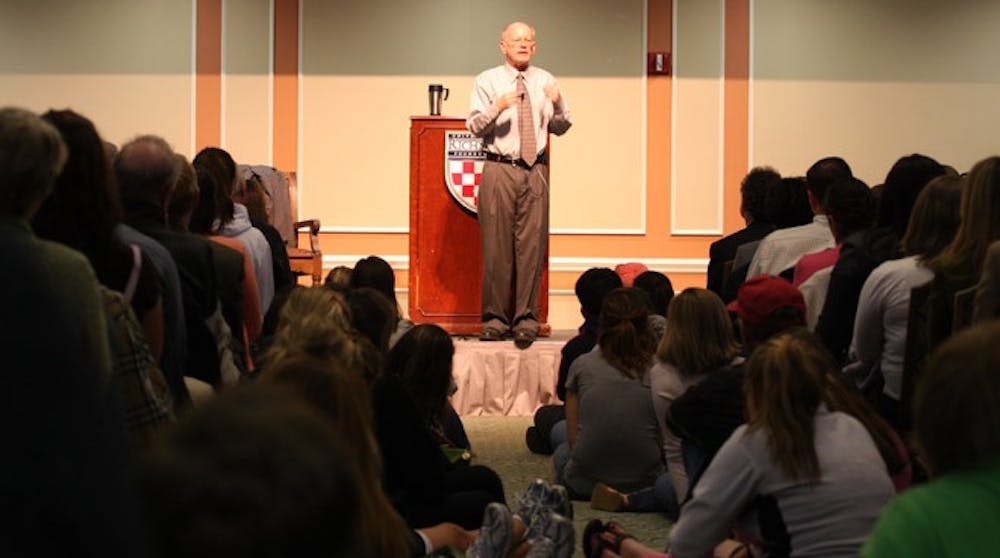Professor Joe B. Hoyle specifically asked for no one to applaud at the end of his lecture.
"I don't want there to be emphasis on me or the end of the lecture," he said. "I want the emphasis to be on you."
Students, alumni, faculty and many members of the community piled into the Jepson Alumni Center on Tuesday night to hear Hoyle deliver his "last lecture," the first of what is planned to be an annual event at Richmond.
The idea of a last lecture series was based on the book "The Last Lecture," written by Randy Pausch, a Carnegie Mellon University professor who was suffering from terminal cancer at the time. Students at Richmond voted on a professor whom they wished to answer the question, "If you were to address students at the University of Richmond for the last time, what would you say?"
Hoyle started out with about 20 ideas about what he would talk about in his last lecture, he said, but ultimately wound up with two topics to choose from: William Faulkner or the three Westhampton seniors who helped put together his last lecture performance - Erin Fields, Adrian Bitton and Sarah Latimer.
Hoyle ended up focusing his lecture on a quote by Faulkner, but not before spending a significant amount of time telling the audience what he would have said about those three students if that had been the topic he had chosen. In addition to Faulkner, Hoyle spoke about several people who would seemingly not have many similarities, from Richmond students and alumni, to Michael Jordan, Vince Lombardi and Mister Rogers.
In 1982, a student in one of Hoyle's classes gave him a Faulkner quote that became the basis of his lecture: "Always dream and shoot higher than you know you can do. Do not bother just to be better than your contemporaries or predecessors. Try to be better than yourself." Hoyle used this quote to draw the focus of his lecture - making a transition.
"It's easy to be average," he said, but it is making a transition from ordinary to great that is the challenge.
He also used a quote by Michael Jordan to get his message across: "If you run into a wall, don't turn around and give up. Figure out how to climb it, go through it or work around it."
Hoyle challenged the audience members to face their own walls.
"If you never run into walls, would you ever be any better?" he asked. "Of course not. It's the walls that make you better."
Throughout the lecture, Hoyle posed a series of six questions to the audience, something he said was similar to his classroom teaching style.
Enjoy what you're reading?
Signup for our newsletter
"I teach by asking weird, strange, odd questions," he said. Each question was followed by an example of a student who had answered or inspired the question, by going through a transition or getting over their own wall.
His first question was, "As you think about the next year or two of your life and you think about what you're going to accomplish, what is the biggest dream you have?" His other questions challenged the audience members to think back on the last time they did a good Samaritan act, did something they got excited about, introduced themselves to someone new or did something they would describe as bold.
He also asked them to think about who their heroes were, which was where Vince Lombardi and Mister Rogers came into play.
"I don't care if you're 100 years old or 8 years old," he said. "You need heroes."
At the end of his lecture, Hoyle posed a challenge to the audience.
"You are all extremely talented," he said. "Society needs you to get on the other side of that wall. Think of some way that you're going to make a difference in this world, and I'll tell you to go for it."
Contact reporter Sharon Tully at sharon.tully@richmond.edu
Support independent student media
You can make a tax-deductible donation by clicking the button below, which takes you to our secure PayPal account. The page is set up to receive contributions in whatever amount you designate. We look forward to using the money we raise to further our mission of providing honest and accurate information to students, faculty, staff, alumni and others in the general public.
Donate Now



